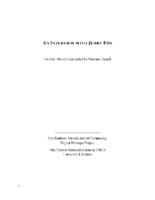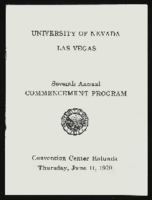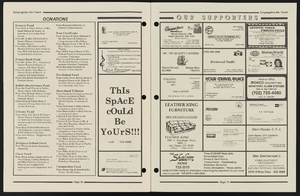Search the Special Collections and Archives Portal
Search Results
Richard Ronzone Photographs
Identifier
Abstract
The Richard Ronzone Photographs depict Las Vegas, Nevada storeowner and politician Richard “Dick” Ronzone and his family from 1920 to 1989 and 2001. The photographs primarily depict Ronzone at Ronzone’s Store in Las Vegas, at events with politicians such as Nevada Governor Paul Laxalt, or at the Las Vegas Valley Water District. The photographs also depict Ronzone during his service with the Nevada National Guard; portraits of Ronzone, his wife Ann Roeth Ronzone, and his mother Bertha Ronzone; and events during Ronzone’s tenure as a Clark County Commissioner from 1972 to 1980.
Archival Collection

Transcript of interview with Shecky Greene by Barbara Tabach, June 5, 2018
Date
Archival Collection
Description
At the time of this interview, Shecky Greene (1926 - ) is energetically snuggled into his modest Henderson home. His wit and signature sense of humor are at in full swing. Shecky sees a joke in every nook and cranny of a conversation and seamlessly spins the moment with a tune or voice characterization. A native of Chicago, his given name is Fred Sheldon Greenfield. His Jewish parents, Bessie and Carl Greenfield raised Shecky and his older two brothers in a secular but kosher setting. He recalls honing his humor as a child and creating his path to a decades-long career in comedy lounges and in film. His narrative glitters with names of Las Vegas entertainment history. He also talks about his passion for the St. Judes Ranch in Boulder City.
Text

Transcript of interview with Mindy Unger-Wadkins by Barbara Tabach, October 28, 2015
Date
Archival Collection
Description
In this interview, Unger-Wadkins discusses growing up in Las Vegas? close-knit Jewish community in the 1960s and 1970s, and involvement with various Jewish youth organizations and activities. She also describes her career in public relations, reflecting upon the unique challenges faced when interacting with the public, and with politics, in her positions. Unger-Wadkins ends by describing her current work in land development, particularly the history of the Three Kids Mine and the technical and political process of ensuring the land is suitable as a residential area.
Text

Transcript of interview with Freddie Glusman by Barbara Tabach, October 29, 2015
Date
Archival Collection
Description
In this interview Glusman discusses his early memories of being raised in Vancouver, Canada and how he ended up in Las Vegas. He reflects on how he first got his start in the town and his early dealings with casinos and their owners while he was working as a carpet and drapery salesman and while working for Fabulous Magazine. Glusman explains how he started his restaurant and tells about the people he encountered while doing this that where significant to both the Jewish community and Las Vegas as a whole. He recounts stories that include such people as Meyer Lansky, Al Sachs, and Moe Dalitz.
Text

Transcript of interview with Jerry Fox by Barbara Tabach, November 12, 2014
Date
Archival Collection
Description
Interview with Jerry Fox by Barbara Tabach on November 12, 2014. In this interview, Fox discusses his father's restaurant, Foxy's Delicatessen, which opened on the Las Vegas Strip in the 1950s, and his own business endeavors including the Tinder Box and an embroidery business.
Jerry Fox grew up in Los Angeles until his family moved to Las Vegas in February 1955, where his father opened Foxy's Delicatessen, the city's first Jewish deli. Jerry would go on to follow in his father's entrepreneurial footsteps, operating several ventures across different industries, including his own restaurant, Foxy Dog. Jerry sold Foxy Dog in 1975 after going through a divorce, the same year that Foxy's Deli closed.
Text

University of Nevada, Las Vegas (UNLV) 7th commencement program
Date
Archival Collection
Description
Commencement program from University of Nevada, Las Vegas Commencement Programs and Graduation Lists (UA-00115).
Text
University of Nevada, Las Vegas School of Architecture Records
Identifier
Abstract
The University of Nevada, Las Vegas School of Architecture Records (1980-2011) include marketing material, curriculum development material, student letters to the Nevada legislative counsel, journals, newspaper clippings, and architectural drawing sets for the school building's construction.
Archival Collection
Barbara Tabach Collection on the New Frontier Hotel and Casino, Las Vegas
Identifier
Abstract
The collection contains material collected by Barbara Tabach to document the final days of the New Frontier Hotel and Casino in Las Vegas, Nevada (2007). Included are brief oral history audio recordings and transcripts for approximately 50 individuals wo worked at or were customers of the New Frontier, as well as over 650 digital photographs of the people and the building. Also included is a digital video of the November 2007 implosion and a
Archival Collection
Florence McClure Photograph Collection
Identifier
Abstract
The Florence McClure Photograph Collection (approximately 1985-1997) consists of color photographic prints. Images show McClure and members of the Las Vegas, Nevada Community Action Against Rape (CAAR) organization that she co-founded with Sandi Petta in 1973. Also included are images of Nevada public figures and several travel images from China.
Archival Collection

